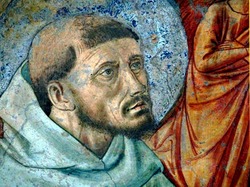Some have called Liliana Cavani's Francesco (1989; DVD 1998) a gritty alternative to Franco Zeffirelli's Brother Sun, Sister Moon. And I agree. Zeffirelli, while a brilliant filmmaker, can ruin a saint. And whatever may be said of Cavani's work, Francesco is neither a saccharine nor romantic portrayal of the 13th century's radical saint, Francis of Assisi. His sincerity is strikingly beautiful. This movie is based on Herman Hesse's book Francis of Assisi. Cavani's film won three awards and was nominated for a fourth. The legendary actor/boxer/dog lover and practicing Catholic, Mickey Rourke, played Saint Francis. And as a side bar, he credits his Catholic faith to saving his life.

Liliana Cavani, born in 1933 in Capri, is the director of many television and cinematic productions. Her religious tendencies are basically unknown to me but I did hear that she leans or leaned toward a communist ideology. But I can't help wondering what really inspired Cavani to direct a film on such a figure as Francis of Assisi. Certainly it can't be the wacky-ness that often surrounds the figure of Francis!
Francesco is an interpretation of the person of the 13th century Umbrian saint, Francis of Assisi. He died in 1226 and founded what is today called the Franciscans 800 years ago. What the Franciscans looked like in the 13th century isn't what they are today. The movie is a series of flashbacks with various friends telling the story of the man who led them to Christ. Cavani brings out several central questions that all of us have to answer viz. our Christian faith: To whom do I belong? Do I belong to these people, or do I belong to Christ? How do I know and why?
The period in which the real Francis lived was a chaotic time in secular as well as ecclesial history. His world was faced with civil strife, wars, disease, extreme poverty in many sectors, illiteracy not to mention heretical movements tearing the fabric of faith to pieces. And, let's also not underestimate the wounds of the Church faced as a result of heresy: lack of true community, negligence of the human body, despair, lack of reasonable understanding of the faith and Truth and no reasonable response to the human reality. Hence, the notion of Francis rebuilding the Lord's Church took on significant importance for many people.
Why Francesco? It has little to do with the fact that his October 4th feast day is next Sunday. But it has everything to do with the fact that in our School of Community (Communion & Liberation's weekly catechetic meeting) we are reading Father Giussani' chapter on poverty in volume 2 of Is It Possible to Live This Way? There we are confronting the real, and truly theological reality, of possessing without possession. Giussani is raising the concern of restraining the possibility of grace in our lives but how we live our lives. So many of us can't face life in the manner in which it is given. We create escape mechanisms to mask the real life issues: pain, love, sorrow, faith, hurt, joy, lack of happiness, etc. Francis gave his whole life away to another person. He confused his parents and siblings; his friends and civil authorities were shocked. All could not understand Francis turning on end what was conventually known as "normal." He found something wonderful among the poor that became a contradistinction to the bourgeois normativity of Umbrian society. Renouncing self and possessions and following Christ crucified became his "normal." As Saint Clare says in the movie, God spoke to him again and His love made Francis' body identical to the Beloved's.

Cavani deals with poverty in a gritty manner--it is terrifically human. And she never moralizes poverty or religious conviction. Even when the pope asks Francis "and what are you criticizing me for" and Francis says "nothing" we can't believe our ears. Two men come back to Francis' family and friends looking to explain what they experienced and thinking that the men would point out the ugliness of poverty and extreme raw life of Francis, they said, "there's something beautiful there." You then realize that Francis isn't following "poverty"; he's following someone; he's closely adhering to beauty. But it is not ordinary beauty--it is the beauty of believing that he promises of Christ are true.
Why Francis? Because he points to Christ. His faith, courage and thinking he could live like Christ is what Giussani wants to suggest is the reason for our life. Giussani asks, quid animo satis? (what can satisfy the soul?) It has to be the Gospel at it's word or all is rubbish. Francis, by the way, is the only person the Church calls an alter Christus among the saints.


I have always loved Francesco, even in its faults. I don't understand why so few friars seem to like it! I especially appreciate the stigmata section and the use of the 'Francis and the snowmen' material. The music suits as well, in my opinion.
I agree, it's relatively unknown and under-appreciated. I found the snow and stigmata scenes well done, especially the latter. Perhaps more people like saints portrayed by romantic filmmakers so that they don't have to be impacted by the saint's often direct and "unfriendly" approach to life. Can you imagine Franciscan, Jesuit or Dominican life if we actually took up the Cavani's approach?